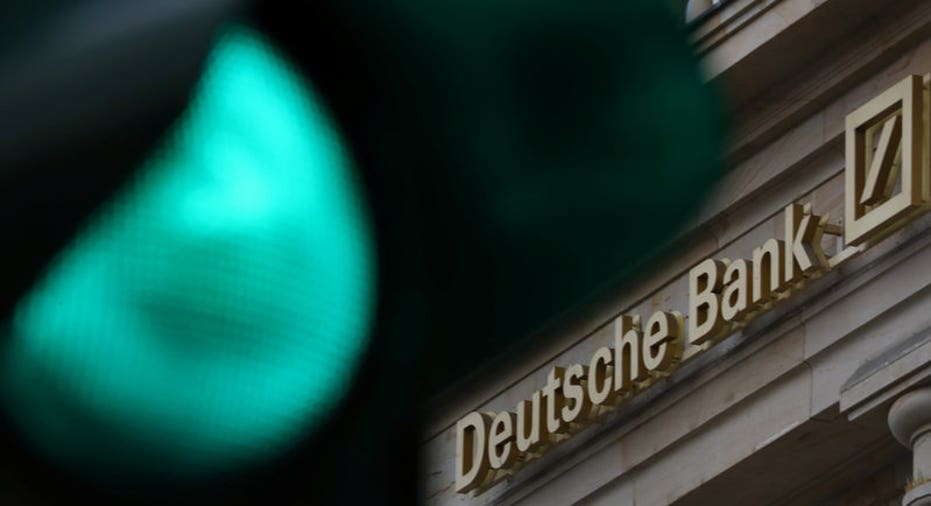Deutsche Bank lags Wall Street in bond trading comeback

FRANKFURT – Deutsche Bank benefited from the rising tide in bond trading in the third quarter of 2016, but as it struggles with the protracted overhaul of its investment bank, Wall Street rivals are stealing a march.
The volatile markets between July and September, sparked by Britain's vote to leave the European Union and bouts of anxiety about monetary policy around the world, would normally be perfect conditions for Deutsche Bank's fixed-income business to turn a hefty profit.
Indeed revenues at its cash-cow bond trading division were up 14 percent compared with the same period last year to nearly 2.1 billion euros ($2.29 billion), helping the German lender post an unexpected quarterly profit on Thursday.
But the rise was muted compared with that seen at U.S. banks which saw their combined revenue from fixed income, commodities and currencies (FICC) rise 49 percent, while European neighbor Barclays posted a 40 percent jump in FICC revenues.
"It was clear that the good Q3 market conditions were going to lift all market players, even those not necessarily in great shape, like Deutsche Bank, " analysts at Kepler Cheuvreux wrote in a note.
Back in 2013, Deutsche Bank ranked third globally for FICC trading, according to data from industry analytics firm Coalition, and had the second-highest revenue from investment banking.
So far in 2016, it is ranked sixth for investment banking, and has ranked between 4th and 6th for FICC trading.
Deutsche Bank blames its relatively poor showing on the ongoing cut-backs in its U.S. business and its efforts to reduce its presence in riskier asset classes.
"Market share is down in debt trading due to the acceleration of our restructuring plan and our regional skew towards Europe and the Asia Pacific region," finance chief Marcus Schenck said on a post-results call with analysts.
"We did not benefit the same as our U.S. peers due to the smaller size of our U.S. credit platform and the strong performance of securitized trading, given our exiting of this business."
Riskier markets such as securitized products, in which Deutsche Bank used to have a large presence, tend to be volatile and come with higher capital requirements.
Deutsche Bank is in the midst of trying to boost its capital cushions, and is aiming to achieve that in part by reducing its holdings of risky assets.
The German lender is also under the threat of a multi-billion-dollar fine from U.S. regulators, which has prompted its management to rethink a year-old strategic overhaul that has made faltering progress, people close to the matter said earlier this month.
Its third-quarter results gave a hint at what scaling back from the United States, its most lucrative market, could portend for the bank going forward.
"We've taken a conscious decision to pull out of a number of markets ... which has cost us some business," said Schenck, adding that in the first nine months of the year around a quarter of the decline in revenues in the markets division could be explained due to the ongoing restructuring program.
"Going forward FICC is likely to be more stable and less seasonal".
Bond trading revenue at most banks has been grinding lower for about seven years as new regulation on proprietary trading, derivatives and capital have restricted what banks can do in bond markets, making the business less lucrative.
From 2010 to 2015, bond trading revenue fell 36 percent across the industry, while equities trading revenue rose 23 percent. Equities includes revenue from trading stocks and related derivatives, as well as prime brokerage services.
In a reversal of fortune this year, revenues from equities trading has declined broadly across the industry, hit by uncertain and volatile markets that have left investors more averse to risk.
Deutsche Bank reported a 5 percent decrease in equities trading revenue to 603 million euros in the third quarter.
The global markets business, which includes all the bank's trading activities, posted a meager 3.5 percent return-on-equity (RoE). Analysts expect banks to produce a minimum RoE of about 10 percent to be meeting their cost of capital.
($1 = 0.9164 euros)
(Reporting by Anjuli Davies; Editing by Rachel Armstrong and Mark Potter)



















